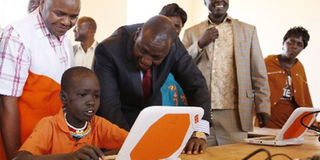Laptops for schools revived

Deputy President William Ruto follows keenly as young Samuel Loyelel takes him through his new laptop when he opened new classrooms at Tipet Primary School in Kapenguria, West Pokot County, on September 26, 2015. PHOTO | DPPS
What you need to know:
- Some 25 companies, including several local universities, are competing to win the multibillion-shilling tender that has been delayed following a dispute over a tender won by an Indian Company, Olive Telecom, in 2014.
- The Ministry of Information, Communication and Technology, through the ICT board, reduced stringent requirements previously placed by the Ministry of Education that required that the winner of the bid be an original equipment manufacturer.
- Major bidders who participated in the aborted procurement managed by the Ministry of Education last year have given the bid a wide berth save for the American-owned Hewlett-Packard EA Limited.
A total of Sh 17 billion will be spent to buy 1.2 million laptops for Standard One pupils after the salvaged procurement was launched by the ICT Authority.
The laptops will reach all schools around the country in two years after the procurement was split into two.
Some 25 companies, including several local universities, are competing to win the multibillion-shilling tender that has been delayed following a dispute over a tender won by an Indian Company, Olive Telecom, in 2014.
The Ministry of Information, Communication and Technology, through the ICT board, reduced stringent requirements previously placed by the Ministry of Education that required that the winner of the bid be an original equipment manufacturer. This allowed secondary suppliers to compete for the bid.
According to the delivery timelines, 600,000 devices will be supplied by the end of June next year and the remaining 600,000 a year later in 2017.
2017 COMMISSIONING
President Uhuru Kenyatta is tentatively schedule to commission the project days before the General Election in August 2017.
“A total number of 1.2 million devices will be procured. This excludes projectors and other infrastructure necessary,” said Mr Felix Oganga, the director of corporate services at the ICT Authority.
“The bidders had 14 days to respond to the (call for) expression of interest, and are expected to be evaluated on five aspects,” Mr Oganga stated.
The evaluation will focus on legal formation of the company or consortia, demonstration in research and development in technology, financial capability and experience and expertise.
“Eligible bidders should have completed three similar assignments in the last five years either individually or as members of the consortium,” he said.
Five key areas are covered. These are teacher capacity, content development, power to schools, devises and infrastructure and setups of local assemblies.
The tender was officially advertised last month.
Servers and routers will also be supplied while power connections in nearly all schools around the country are expected to be completed by mid next year.
Major bidders who participated in the aborted procurement managed by the Ministry of Education last year have given the bid a wide berth, save for the American-owned Hewlett-Packard EA Limited.
One company, Squid Africa Ltd, was disqualified because it presented vital documentation late.
LOCAL ASSEMBLY
Jomo Kenyatta University, the University of Nairobi, Masinde Muliro, Moi University, Meru University, Multimedia University, Kenyatta University and Dedan Kimathi University have formed consortiums with foreign firms to provide local assembly for some international manufacturers or suppliers.
International IT solution giants including Chinese Lenovo, Dell and Techno Brain have also presented bids in one of Kenya’s most controversial tenders.
Other giants, including Haier, appeared to have kept off the reputation-threatening project previously dogged by controversies due to business and political interests.
Sources at the ICT Authority told the Nation that 15 more bidders and consortiums may have been dropped, leaving only 10, with three companies expected to reach the financial evaluation stage.




